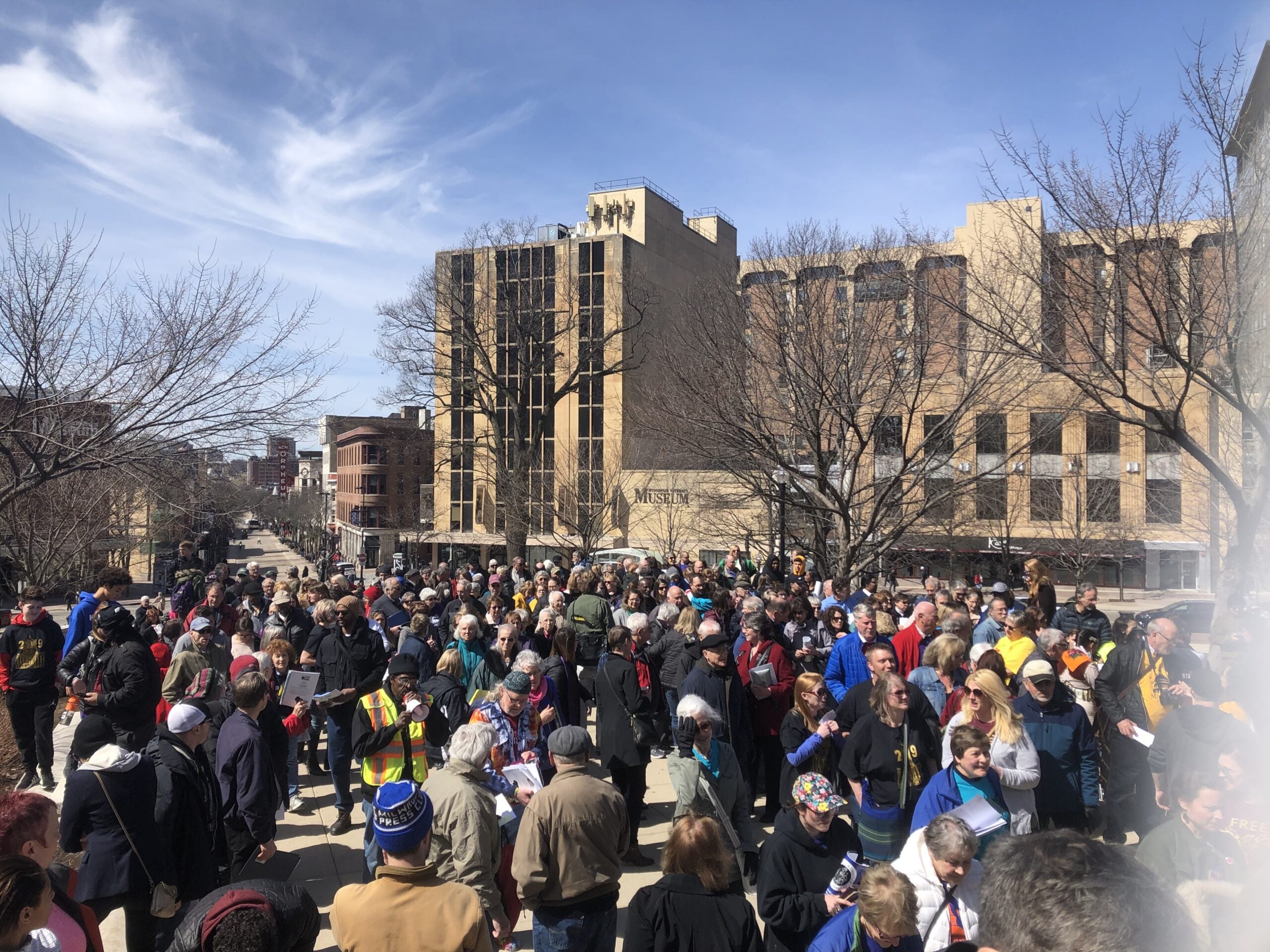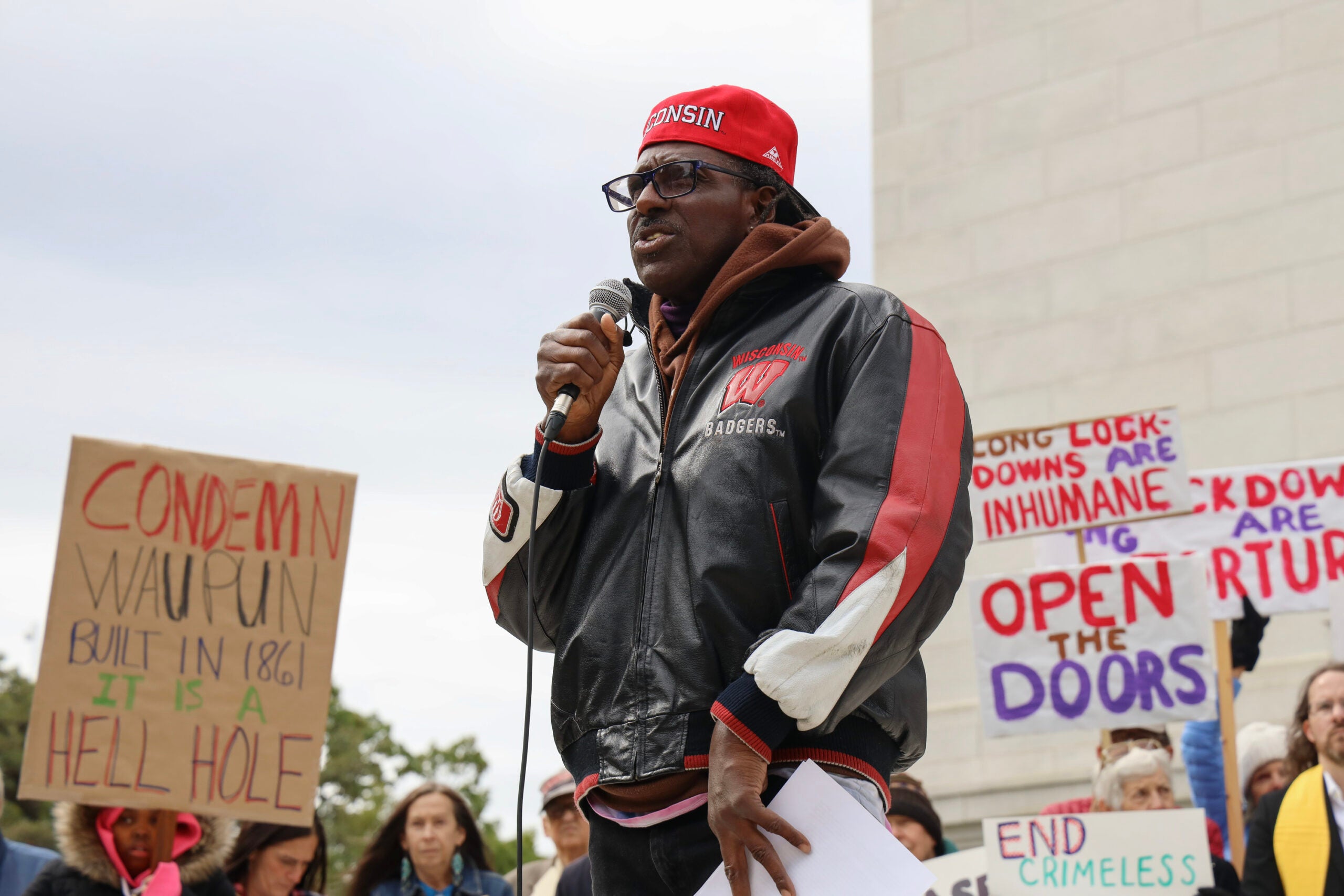Hundreds of people from around the state stood on the steps of the state Capitol Tuesday, challenging systemic racism with chants led by the Rev. Marilyn Miller: “Old Jim Crow or new Jim Crow, the racist system has got to go!”
Inside, they met with state lawmakers to support some parts of Gov. Tony Evers’ budget and to oppose others, especially expanding Wisconsin’s prison capacity as part of the day of action for WISDOM, a faith-based, social justice group.
“Showing our power and truth to justice, that’s what we’re out here doing,” said Robert Agnew Jr., a community organizer with JustLeadershipUSA. “We know that freedom is on the other side of this fight.”
News with a little more humanity
WPR’s “Wisconsin Today” newsletter keeps you connected to the state you love without feeling overwhelmed. No paywall. No agenda. No corporate filter.
The activists and residents pushed for racial justice through various sectors. Budget proposal elements they urged support for included increased funding for public transit, public education and health care, as well as Evers’ plan to expand driver’s license eligibility to those living in the country illegally.
They also took a strong stance against mass incarceration, calling for a number of reforms — some of which the governor has previously said he supports. They urged lawmakers to support limiting solitary confinement, boosting funding for treatment alternatives and diversion programs, reforming revocation policies, reviewing parole eligibility for all inmates and shutting down the Milwaukee Secure Detention Facility (MSDF).
They offered many of these measures as alternatives to Evers’ financing request for an additional 288 beds in Wisconsin’s state prisons, outlined in his capital budget proposal, which they don’t support.
Melissa Baldauff, deputy chief of staff for Gov. Evers, responded to that specific criticism by saying: “Our system is already overcrowded, and we know that if people are going to be incarcerated, they need to be safe.”
Agnew leads the #CLOSEmsdf campaign, along with partners at WISDOM and EXPO, an organizing group composed of formerly incarcerated individuals. Angew placed closing the detention facility and ending “crimeless revocations” at the forefront of his fight.
Eighteen people have died at MSDF since it opened in 2001. Last week, 51-year-old William Leary became the most recent person to die inside the prison. The Milwaukee Journal Sentinel reported the medical examiner’s evaluation mentioned a handwritten note from Leary, which complained about a lack of medical care.
A spokeswoman for Evers said by email that she can’t comment on Leary’s death because the investigation is ongoing.
Members of the #CLOSEmsdf effort said the treatment inside the facility is inhumane, citing poor light and limited time outside the cell. On the campaign trail, Evers said he supported closing the facility “as soon as possible.”
Participants in WISDOM’s action day also planned to ask lawmakers to eliminate crimeless revocations, which refers to the re-incarceration of someone out on probation or parole — not for committing a new crime — but for a technical rule violation, such as missing a curfew or an appointment with an officer.
A report released earlier this year by the Columbia Justice Lab found that crimeless revocations are a significant driver of incarceration in Wisconsin. It also found that 86 percent of people held in MSDF for revocations didn’t receive an additional conviction, and that at the end of 2017, 76 percent of all those incarcerated for revocations were black. MSDF is the first state facility in the U.S. built for the primary purpose of jailing those who have had their parole or probation revoked.
Ending crimeless revocations appears on Evers’ campaign website as a criminal justice reform.
Activists delivered a letter to the governor’s team on Tuesday detailing some of these requests, including closing MSDF and ending crimeless revocations.
Baldauff, Evers’ staffer, wrote by email:
“The governor is spending millions of dollars to address the prison population in his first budget — the way we are doing it is by making sure fewer people are incarcerated in the first place. That includes significant investments in Treatment and Diversion (TAD), expansion of nonviolent offender diversion programs, community policing, wraparound services, and early interventions. We’re also helping reduce recidivism through substantial investments in reentry programs that provide essential job training and skills development for returning citizens.”
As well, the governor believes in the power of redemption. That’s why he proposed banning the box in his budget and is working to re-establish a Pardon Review Board in the coming weeks.
We look forward to hearing from and learning from advocates who share the governor’s commitment to reforming our criminal justice system.”
The state Department of Corrections didn’t respond to a request for comment. However, in a previous statement to WPR, they said: “Under Governor Evers’ leadership, DOC is prioritizing the reduction of Wisconsin’s prison population and the reduction of crimeless revocation.”
Wisconsin Public Radio, © Copyright 2026, Board of Regents of the University of Wisconsin System and Wisconsin Educational Communications Board.


